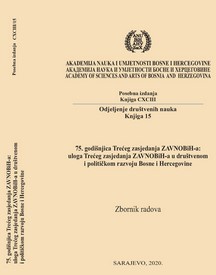ZAVNOBIH I PROBLEM SOCIJALISTIČKOG FEDERALIZMA
ZAVNOBIH AND THE PROBLEM OF SOCIALIST FEDERALISM
Author(s): Asim Mujkić
Subject(s): Political history, Government/Political systems, Political behavior, Comparative politics, Nationalism Studies, WW II and following years (1940 - 1949), Transformation Period (1990 - 2010), Inter-Ethnic Relations
Published by: Akademija Nauka i Umjetnosti Bosne i Hercegovine
Keywords: federalism; socialist federalism; ethno-nationalism; ZAVNOBiH; People's Republic of Bosnia and Herzegovina;
Summary/Abstract: The crucial task of the Third Assembly of the Anti-Fascist Council of the People’s Liberation of Bosnia and Herzegovina (ZAVNOBiH) was to create a framework for the establishment of further development of Bosnia and Herzegovina as federal Unit. This assembly resulted in the important acts for Bosnia and Herzegovina as a member of Yugoslav Federation such as the constitution of the first Peoples Assembly, and the Law on People’s Government based on which, two days later, April 28, 1945. the first People’s Government had been formed, etc. However, one important question remains – what kind of federation was Yugoslav socialist one? Socialist Yugoslavia looked after Soviet federation as its model which, in scientific literature, could best be described as ethnoterritorial federalism. So Yugoslavia was simultaneously understood as the federation of its peoples and its republics in which its peoples practiced their sovereign rights. Based on this double approach, the two interpretations of Yugoslav federalism developed in time: the unitary-centrist one which considered the borders of republics as administrative, and the republican-federalist one which considered republics as sovereign national states. There was also a third variant of socialist federalism developed during 1970’s – the socialist self-management federalism which delegated the political subjectivity down to the level of individual enterprises and local communities designed to undermine nationalist interpretation, but it failed to be implemented due to already strengthened etatisms. These federalist dilemmas were especially fatal for Bosnia and Herzegovina which could not have been constituted as national republic-state.
- Page Range: 265-280
- Page Count: 16
- Publication Year: 2020
- Language: Bosnian, Croatian, Serbian
- Content File-PDF

